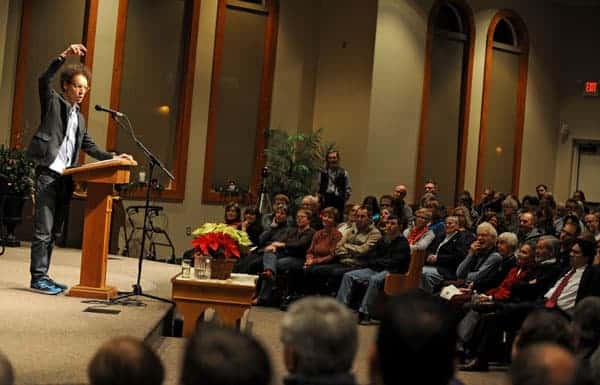Bestselling author discusses the ideas found in his latest book to a welcoming audience in Floradale
![Author Malcolm Gladwell was at Floradale Mennonite Church on Wednesday night to discuss his latest book, David and Goliath: Underdogs, Misfits: and the Art of Battling Giants. [Elena Maystruk / The Observer]](https://www.observerxtra.com/content/images/wp-content/uploads/2013/11/post_gladwell.jpg)
Citing lemons-to-lemonade stories of how adversity can lead to triumph, author Malcolm Gladwell entertained a full house at Floradale Mennonite Church Wednesday night with excerpts from his latest book, David And Goliath: Underdogs, Misfits, and the Art Of Battling Giants.
More than 600 people attended the homecoming-of-sorts for the former Elmira resident, a long-time staff writer at The New Yorker. He’s also the author of four New York Times bestsellers.
As the slender biblical character fought and defeated his giant, so too is the new book meant to challenge our perceptions of real-life shortcomings and disadvantages, both in individuals and in businesses.
Substantiated by numerous case studies such as Northern Ireland’s “Troubles,” the book posits a new take on what it means to be disabled, experience the death of a parent or have educational setbacks, among other disadvantages.
It’s precisely this example that he brought to audiences on Wednesday in explaining legitimacy, a concept prevalent in his book focusing on a congregation of women who unblinkingly marched on the police forces during the conflict in Belfast as sectarian violence flared up in 1969.
“Women with children at home and husbands do not march on armed men, but they do when they’ve been denied legitimacy, because what happens to people when they are denied legitimacy? They get angry. And one of the mistakes that those in power make again and again in our world is that they forget what an extraordinary and unstoppable and incredible force that kind of anger can be,” said Gladwell of the Catholic resistance to the British Army.
When people do not feel that laws are legitimate – a concept he defines by fairness, trustworthiness and respect as it pertains to individuals – they rise up.
Gladwell continued the same stream of thought in an anecdote on women’s suffrage through the eyes of Alva Vanderbilt Belmont, who defied her humble beginnings in Mobile, Alabama to become a New York socialite. In later years, she became a radical and one of the leading forces behind the city’s suffrage movement.
“To deny someone respect and trust and fairness is a serious blow to their views about the legitimacy of the system,” he said.
In its application of what reviewers have called a “counterintuitive” definition of the David-Goliath metaphor, Galdwell’s book looks at the dynamics such as those found in comparing successful and unsuccessful classrooms, the kids reared in good schools versus mediocre ones. He goes on to identify the seldom-recognized advantages an underdog company can have over its big-box competitors.
The book garnered two unfavourable reviews from the New York Times, but received a warmer welcome north of the border from the likes of the Toronto Star which called it “counterintuitive and absorbing” and The Globe and Mail:
“The populist theme of Gladwell’s recent book couldn’t come at a more fitting time, an era in which corporate giants rule the Earth, stagnant economic mobility and the hovering towers of the Ivy League ever more distant,” a review by Craig Offman reads.
Four of Gladwell’s previous books were New York Times bestsellers, including his first, “The Tipping Point,” which was expanded from a 1996 article that popularized the phrase.
After attending Elmira District Secondary School, Gladwell received a history degree from the University of Toronto and got his start at the Washington Post as a staff writer in 1987 to become the paper’s New York City bureau chief a decade later. He’s been a staff writer with The New Yorker since 1996. He’s won prestigious awards for his journalistic and literary works including the National Magazine Award for Profiles in 2001 and was inducted into the Order of Canada in 2011.
Proceeds from Wednesday night’s event will be donated to the Woolwich Counselling Centre, founded in part by Gladwell’s mother, Joyce.









